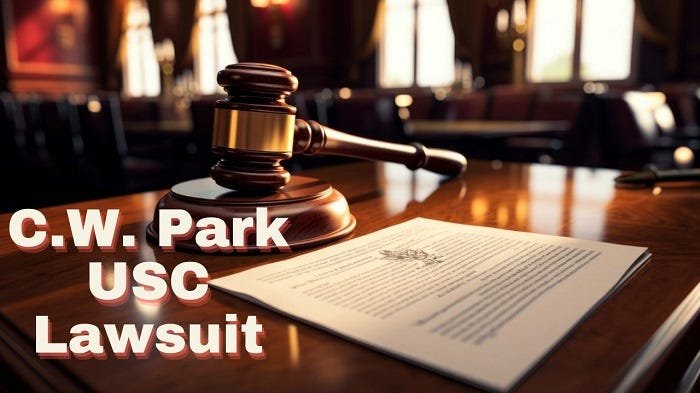Introduction to the C.
W. Park USC Lawsuit
The recent C.
c.w. park usc lawsuit has sent shockwaves through the academic community, raising important questions about accountability and ethics in higher education. As allegations swirl around a prominent figure at the University of Southern California, it’s crucial to delve into the details, understand the implications, and explore how institutions are addressing issues of sexual harassment on campus. Let’s uncover the layers of this complex situation and shed light on what steps are being taken to ensure a safer environment for all students and faculty members.
Details of the Allegations Against C.
W. Park
The allegations against C.
W. Park, a former professor at the University of Southern California (USC), have sent shockwaves through the academic community. The lawsuit accuses Park of engaging in inappropriate behavior towards his students, creating a hostile work environment rife with harassment and misconduct.
According to reports, multiple female students have come forward with claims of sexual advances and unwanted contact by Park. These disturbing accusations paint a troubling picture of abuse of power and violation of trust within an educational setting meant to foster learning and growth.
The details emerging from the case shed light on the insidious nature of sexual harassment in higher education and highlight the importance of holding individuals accountable for their actions. Such behavior not only damages the lives of those directly affected but also undermines the integrity and reputation of institutions like USC.
As investigations continue into these serious allegations, it is crucial for justice to prevail and for measures to be taken to prevent similar incidents from occurring in the future.
Impact on the University of Southern California
The C.
W. Park USC lawsuit has cast a shadow over the reputation of the University of Southern California, a prestigious institution known for its academic excellence and research contributions. The allegations against Park have raised concerns about the university’s handling of misconduct cases and its commitment to ensuring a safe and inclusive environment for all students and faculty.
The impact on USC extends beyond just this particular case, as it highlights broader issues related to sexual harassment in higher education institutions. It brings into question the effectiveness of existing policies and procedures in preventing and addressing such incidents on campus.
The negative publicity surrounding the lawsuit may also affect USC’s ability to attract top talent, both in terms of students and faculty members. Prospective students may reconsider their decision to enroll at a university embroiled in controversy, while potential faculty hires may be hesitant to join an institution under scrutiny.
Moving forward, USC will need to prioritize transparency, accountability, and proactive measures to address any systemic shortcomings that allowed such misconduct allegations to arise. The university must work towards rebuilding trust within its community and demonstrating a firm commitment to upholding ethical standards across all levels of operation.
Consequences for C.
W. Park and Other Involved Parties
The consequences of the C.
W. Park USC lawsuit are significant not only for the accused professor but also for other involved parties. For C.
W. Park, the allegations have tarnished his reputation and career, potentially leading to legal repercussions and professional sanctions.
For the University of Southern California, this scandal has triggered a wave of scrutiny regarding its handling of sexual harassment cases and overall campus culture. The institution faces pressure to implement more stringent policies and ensure better protection for students and staff from such misconduct in the future.
Other individuals implicated in or affected by this case may experience personal fallout, whether it be damage to their relationships with colleagues or harm to their own standing within academic circles.
As investigations continue and accountability is sought, each party must navigate the aftermath of these allegations with care and consideration for all those impacted.
Discussion on Sexual Harassment in Higher Education
Sexual harassment in higher education is a pervasive issue that can have damaging effects on students and faculty alike. The power dynamics within academia can create environments where inappropriate behavior goes unchecked, leading to a culture of silence and fear. It’s crucial to address these issues head-on and foster a culture of respect and accountability.
Victims of sexual harassment often face significant barriers when trying to report misconduct, including concerns about retaliation or not being taken seriously. This can further perpetuate the cycle of abuse and prevent meaningful change from occurring. Institutions must prioritize creating safe reporting mechanisms and support systems for those who come forward with allegations.
By openly discussing sexual harassment in higher education, we can work towards dismantling harmful norms and behaviors that have been allowed to persist for far too long. It’s essential for universities to proactively implement policies that promote equity, safety, and respect for all members of their community.
Steps Being Taken by USC to Address the Issue
As the USC community grapples with the repercussions of the C.
W. Park lawsuit, steps are being taken to address the underlying issues at hand. The university has pledged to prioritize a culture of safety and respect on campus, implementing new policies and training programs to prevent future instances of misconduct.
Additionally, USC is actively working to enhance its reporting mechanisms for sexual harassment and discrimination cases, ensuring that victims feel supported and empowered to come forward. By promoting transparency and accountability within its ranks, USC aims to foster an environment where all members feel valued and heard.
Collaborating with experts in the field, USC is committed to continuously improving its response protocols and support services for those affected by such incidents. Through ongoing education initiatives and community dialogues, the university strives to create a more inclusive and equitable learning environment for all students, faculty, and staff alike.
Conclusion: Moving Forward and Ensuring Accountability
As the C.
W. Park USC lawsuit unfolds, it serves as a stark reminder of the importance of addressing issues of misconduct and harassment in academic institutions. The allegations against C.
W. Park have brought to light the pervasive nature of sexual harassment in higher education and underscored the need for comprehensive policies and procedures to prevent such behavior.
Moving forward, it is crucial for universities like USC to take proactive measures in creating safe and respectful environments for all students, faculty, and staff. By implementing robust training programs on preventing sexual harassment, enforcing strict disciplinary actions against perpetrators, and fostering a culture of accountability, institutions can work towards eradicating these harmful practices from their campuses.
Ensuring accountability at all levels is essential not only for justice to prevail but also for rebuilding trust within the university community. By holding individuals responsible for their actions and supporting those who come forward with reports of misconduct, universities can demonstrate their commitment to upholding ethical standards and promoting a culture of respect.
By learning from cases like the C.
W. Park USC lawsuit and taking decisive action to address systemic issues within academia, we can strive towards creating an inclusive and equitable educational environment where everyone feels valued and protected. Let this be a turning point in our collective efforts to foster positive change within higher education institutions across the country.










